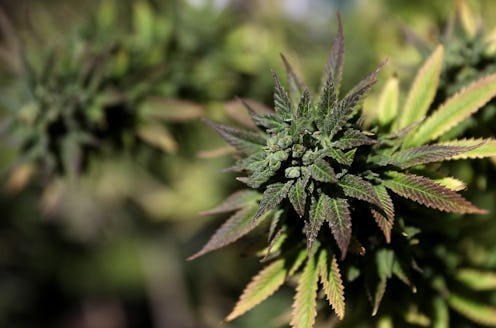Life
Locally Grown Cannabis Is Available At Grocery Stores In Switzerland & It’s Extremely Chill

Cannabis laws in the U.S. remain inconsistent between states, and while a future in which cannabis products are readily available to the average consumer could certainly exist, it's unclear if and when that will happen. In the meantime, retailers in other countries are forging ahead with plans to expand access to cannabis to your average customer. The latest news in the industry is that locally grown cannabis is available at grocery stores in Switzerland. Rather than an excuse to get high at the supermarket, this cannabis product is intended to be entirely chill and relaxing.
According to The Guardian, the German supermarket Lidl will roll out two products derived from hemp flowers to customers of their Swiss stores. This launch comes six years after Switzerland loosened their marijuana laws in order to make medical marijuana easier for patients to get their hands on. As of 2011, Swiss citizens over the age of 18 can purchase cannabis that contains one percent or less tetrahydrocannabinol (THC). In case you've forgotten this lesson from middle school health class, THC is the chemical compound in cannabis that's responsible for feeling high, according Leafly. Basically, cannabis that's only minimally high-inducing is fair game for all adults in Switzerland. Enter growers and manufacturers to make the most of this business opportunity.
The Guardian notes that Lidl's two new hemp products will be merchandised along with cigarettes and cigars at the supermarket's checkout, and they're billed as a more expensive (doubly, to be exact) alternative to tobacco. CBD, the main chemical compound in this particular kind of cannabis, is said to be sufficient to help people relax, but doesn't get you high. While it seems that these products have all the benefits of marijuana without the risk, there are organizations — notably the Swiss charity Addiction Suisse — that are concerned with how they could affect pregnant women who use them, according to The Guardian.
The Lidl products are supplied by The Botanicals, growers based in northeast Switzerland, per The Guardian. A statement from the supermarket says that "the manufacturer relies on sustainable agriculture and refrains entirely from adding chemical, synthetic, or genetically modified substances." The Botanicals grows cannabis indoors, in semi-automated greenhouses, which sounds about as tranquil as the post-cannabis experience itself.
If Twitter is any indication, the reaction to this new product announcement has been positive. The Internet is already wondering when similar products might be available from other retailers and throwing shade at their own countries of origin for failing to be quite so progressive.
There were a handful of European countries on Thrillist's 2015 list of "legal-ish" places to consume cannabis around the world — and Switzerland was one of them. Other cannabis-friendly countries include Belgium, Croatia, the Czech Republic, Estonia, Italy, the Netherlands, Portugal, Russia, Spain, and Ukraine. Given the apparent excitement about the Lidl rollout, it will be interesting to see which other regional grocery stores open up access to low-THC marijuana to shoppers.
According to Governing.com, there are 30 states (plus Washington, D.C.) that "currently have laws broadly legalizing marijuana in some form" as of 2018. These laws facilitate everything from recreational use to retail sales to medical prescriptions for people suffering from severe pain. While you can't pick up rolled cannabis from any American supermarkets at this point, it seems that we're definitely moving in that direction, so who knows what the future will bring?
For now, though, cannabis advocates here in the States can tip their hats to the Swiss for their progressive attitude about patronizing local manufacturers and making marijuana as standard a part of life as the rest of your average grocery list.